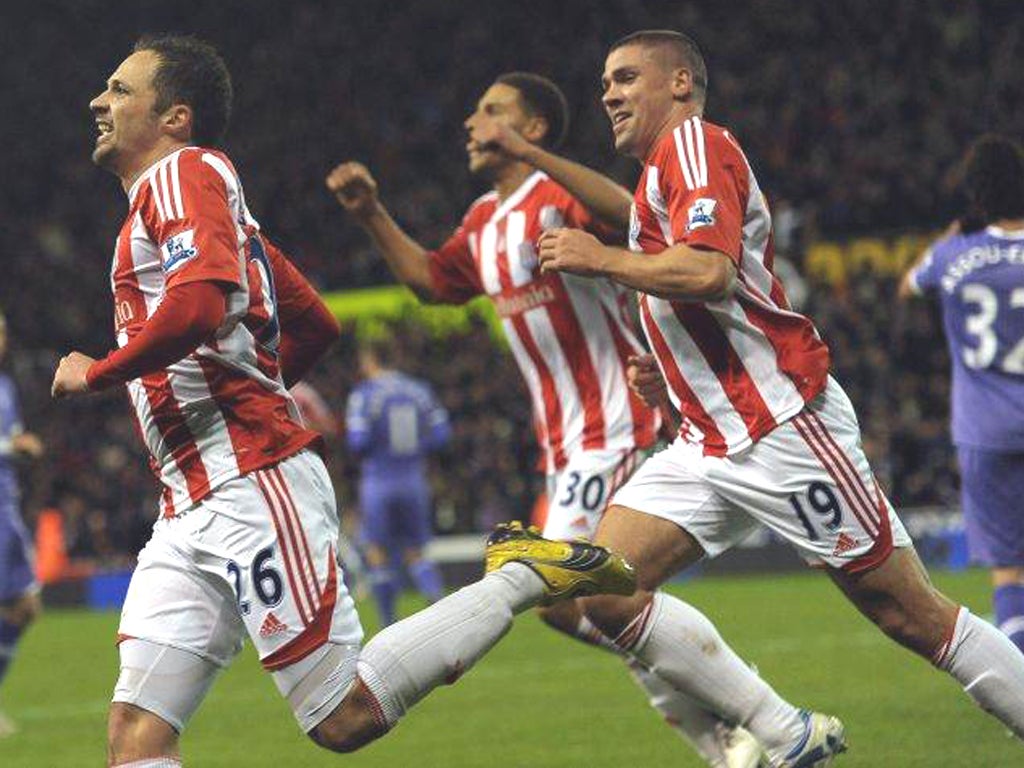James Lawton: Potteries robots lack rhythm of real football

The Stoke City fashioned with ferocious application by their manager, Tony Pulis, have so many admirable qualities it is not an easy thing to say, but say it one must. Their victory over Tottenham, apart from being almost entirely the result of some of the most egregiously wretched match officiating we are ever likely to see, was a triumph for anti-football. Indeed, in terms of natural justice, it wasn't very far from a street mugging.
It was, if we can put aside for a moment the appalling performance of referee Chris Foy, a superbly marshalled version of the dark force, enough to send a surge of pride through the Potteries region which once gave the world the unforgettable magic of the late Sir Stanley Matthews.
Certainly, you can praise Pulis's ability to present the aristocrats of English football with insuperable problems while operating on the treadmill of Thursday night Europa League football and a sharply inferior budget.
You have to respect a professional duty to make life as difficult as possible for your most formidable opponents. You have to warm to some degree to a team so utterly unfazed by the kind of shortfall in natural-born ability they experienced against the likes of Luka Modric, Gareth Bale and Emmanuel Adebayor.
You can even go some way with the splendid old pro Dion Dublin when he declares that one of the great virtues of Stoke is their refusal to "complicate things".
Yet can anyone truly say, once they have taken from the equation the old force of tribal loyalty, that watching Stoke City on a regular basis has much of an edge on a session of root-canal work?
Is the special towel sewn into the shirt of Ryan Shotton, the long-throw successor to the legendary ball-hurler Rory Delap, an article that speaks of the spontaneous glory of the world's favourite game or a robot's artefact?
This is not to insult a young player who, when he isn't throwing the ball vast distances at the head of Peter Crouch, displays some impressively well-rounded football gifts. It is more to worry about the point at which a single tactic is not an arrow in your quiver but pretty much the whole shooting match.
Yes, Stoke do have other assets and most conspicuously a relish for the battle which has established them in the Premier League. Also true is the fact that in the first half against Spurs they showed far more appetite and concentration. The trouble was that Tottenham in the end adjusted to the demands of the contest, producing football both wonderfully engaging and, by some distance, deserving of the spoils.
That they didn't receive their rewards was a direct result of official incompetence. The referee, in this case, utterly distorted the result of a game which might just affect the outcome of such important matters as the destiny of the League title or a place in the Champions League.
In the circumstances, Spurs' manager Harry Redknapp reacted with impressive restraint. In his half-time readjustments, Redknapp recognised the effectiveness of the Stoke tactics and produced a belated game plan which in normal circumstances would have been properly rewarded.
No doubt many will say that bad stuff happens in football, as elsewhere, and that the obligation is to get on with it. However, what happened at the Britannia Stadium was in some ways a classic test of top-flight English football's ability to render something other than a travesty of anything that passed for justice.
This isn't to whinge on behalf of football's resurrected glamour teams, an outfit Bill Shankly once christened, with a snarl, "the Drury Lane Boys". Some Stoke fans were no doubt inclined to agree with that description after Modric went down for a penalty somewhat theatrically. They booed the brilliant little man relentlessly, but it was unquestionably a penalty. Spurs ultimately produced an impressive antidote to the problem of Stoke.
They did it with the football that lifts the heart, with wit and pace and at times quite sumptuous skill. They reminded us why we bother with all the excesses of the game, all the self-promoting hype and the often dreary functionalism produced by players earning more than heart surgeons. It is because we seek out those moments when the game becomes beautiful in its fluent rhythm and explosive possibilities.
Less pleasing for the neutral eye is the trajectory of a throw rifled into a mass of largely anarchic bodies straining for the crucial flick-on. This, with the help of a palpable handling of the ball by Crouch, gave Stoke the vital momentum against a team who had come with a different set of priorities. It was a formidable pressure but long before the end it had been effectively countered.
This did not, however, cause too much of a dent in the belief that, if the circumstances were a little outrageous, the result was still a triumph for a certain kind of courage. But it will never replace the allure of real football.
Subscribe to Independent Premium to bookmark this article
Want to bookmark your favourite articles and stories to read or reference later? Start your Independent Premium subscription today.

Join our commenting forum
Join thought-provoking conversations, follow other Independent readers and see their replies